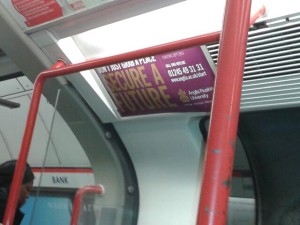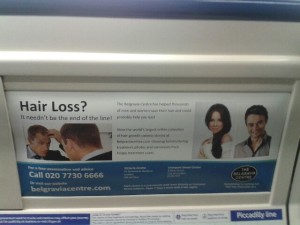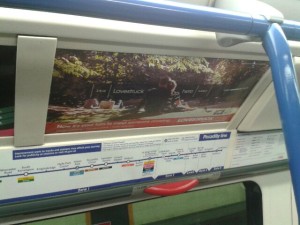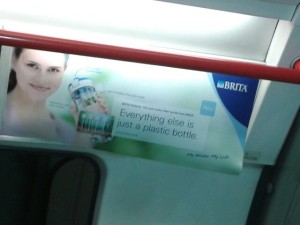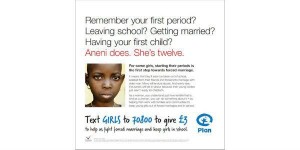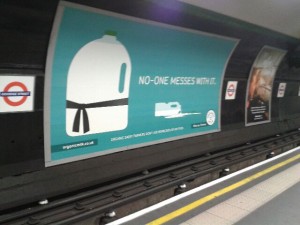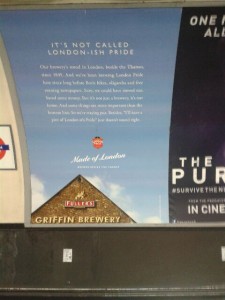[*Warning: the first half of this post is excessively negative, the second half less so]
If you’re anything like me (commiserations, for starters…), your outlook on public transport is ‘avoid eye contact at all costs’, whether on the platform or on the transport itself: you have no idea just how weird the person opposite/next to you is, and it’s probably best not to find out.
This is, in part, why the transport networks are littered with ads – it gives people something else to look at, rather than other humans. Particularly potent are those ads at the top of tube carriages – they serve as the perfect alternative to the the ugly mugs directly opposite you. They’ve probably got the longest dwell time of any advertising space out there, not least if you have to travel the length of the Northern Line. Rarely will an organisation get more one-to-one time with a consumer than they do on a tube carriage.
Why then do so many companies manage to cock up this opportunity so spectacularly?
Take a look at this:
Anglia Ruskin University: ‘Don’t just grab a place, secure a future’.
Name me any other uni you couldn’t attach to that statement?…’University of Salford… secure a future’
Surely the point of going to any uni is not just to turn up, but to actually do something with your qualifications after you’ve finished: the ad is just stating the bleedin’ obvious.
It costs £9,000 to go to uni now – the price of a decent car. Anglia Ruskin are asking you to part with that in return for no more than the bare minimum you would expect from any uni course. This is just lazy advertising.
What about at least mentioning; their heritage, particular courses they’re known for, something about the area in which they’re located – just one thing that makes them different from any other uni?
How about this corker?
Ok, good – I get that The Belgravia Centre can help you if you suffer from hair loss, but who are the two people on the right-hand side of the ad? What have they got to do with hair loss? Did they suffer from it previously? Are they smiling because they’re happy with the service they’ve received? Are they ‘before’ and ‘after’ shots?? … or are they just generic images, downloaded from Getty’s and plonked on an ad?
It would’ve been better not to include them at all, and allow the copy more room to breathe, or to show a balding man and more hirsute one next to him. At the moment it just looks odd.
Dating ads can be pretty poor too, and this one, below, falls into the same trap as the Anglia Ruskin University one:
This Lovestruck ad tells me nothing that would make me use them any more than Match.com: you’ll find a date online.
Worse than that, it goes the Janet-and-John route of literally spelling out what might happen if you use a dating site: image of couple in a park, stating the date and time they met (pre-arranged on Lovestruck.com).
whoop-de-do, a dating website where you arrange dates with people then turn up and meet them. At least Match.com crows about their success rate, in terms of marriages, no matter how cynical you may be of this.
Two more from the rogues gallery, before I switch to the good stuff! First up, Brita:
The nauseating image of smiling-woman-holding-product is bad enough, but ‘everything else is just a plastic bottle’ is simply irritating, not least because the product is a bottle… made of plastic. It reminds me of those company endlines that start ‘more than a…’ e.g ‘more than an estate agent’. Really? What else do they do: haircuts?
The Brita ad finishes with ‘My water. My life.’ What does this mean: take control of your water?
Why not finish with something that at least sums up the benefit of this product Vs Evian: ‘why pay for water?’ (okay, not perfect but better than ‘my water, my life’).
Final criticism, then on with the nice stuff:
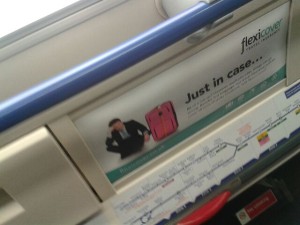
We all know what a bad pun does, it makes you groan. Why would you want to make potential customers groan?
When a pun is funny on both sides of its double-meaning it can be funny – I quite like this, from the comedian Milton Jones: ‘my grandad has been quite ill recently. He was starting to get better, but then we rubbed lard on his back. He went downhill very quickly after that’.
The pun in the Flexicover ad, above, is atrocious. It serves no purpose in selling the product other than being a pun based on travelling with a suitcase, next to an image of a suitcase. It makes me think that Felxicover are a bit silly really.
This is an example of how you make a good tube ad (I didn’t have a shot of it in-situ, so had to look it up):
It’s brilliant. It’s so impactful. It draws you into the story, then ‘bang!’ hits you with force at the end. I remember being jealous of this, as a piece of copy, when I first saw it.
The rest of the copy is about the work of Plan and what you can do to help girls like Aneni.
This ad is on a train platform, rather than the train itself, but still somewhere where you might be waiting three or four minutes:
Yes, it’s a visual pun, but the joke works on both sides of the double entendre. Because of this (and the cute artwork) I take the message away with me: organic milk is pure.
It’s quick, it’s simple, it works; no messing (see what I did there?)
Last but not least: London Pride – a long copy ad that oozes class:
The body copy is a bit blurry, but reads: ‘Our brewery’s stood in London, beside the Thames, since 1845. And we’ve been brewing London Pride here since long before Boris Bikes, oligarchs, and free evening newspapers. Sure, we could’ve moved out. Saved some money. But it’s not just a brewery, it’s our home. And some things are more important than the bottom line. Besides, “I’ll have a pint of London-ish Pride” just doesn’t sound right.’
Beer is one of the hardest things to differentiate when trying to sell it – it’s all brown, fizzy liquid, right?
This London Pride ad finds something of a point of difference – its heritage – and rams it home. It’s wonderful, warm, prosaic, chest-puffing copy about why you should feel positively disposed towards this particular brand of kebab-enhancer.
It talks how everyday people talk and throws in things its audience – Londoners – will recognise (‘Boris Bikes, oligarchs, free evening newspapers’).
It gives at least one reason to buy London Pride over Stella: it’s true to its roots, it’s London through-and-through.
Anyway, that’s me done, but there it is: public transport offers a real opportunity to get a considered message across to consumers – don’t mess it up!
